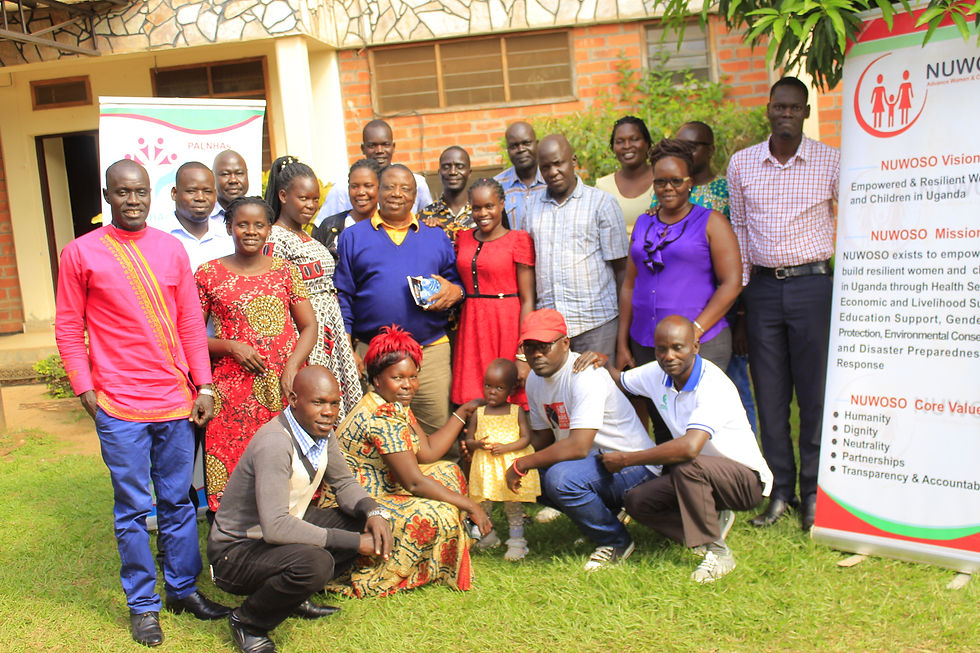A Look into Lack of African Voices in Localization in Achieving Sustainable Lives
- Lakomekec Kinyera

- Jun 20, 2022
- 4 min read

Members of the PALNHAs post for a group photo out Friendship Hotel in Gulu city after a two-day workshop on framework formation on 16th June 2022.
Background and introduction
Before the rise of the humanitarian industrial complex in the late 1980s, African Civil Society Organizations (CSOs) served as the primary emergency responders across the continent. In that capacity, they were the primary interlocutors of the governments in their countries of operation.
These organizations operated in economically and politically challenging environments and made whatever impact they could with limited means. Their position vis-à-vis governments and the crises they sought to address changed with the arrival of international actors.
The latter, which first intervened to address humanitarian suffering from cataclysmic developments such as the Biafra War in the late 1960s and the famine in Ethiopia in the 1980s, inched their way into spaces that previously had been the focus of local organizations, including corruption, economic justice, and human rights.
Today, humanitarian engagement in Africa is driven by events such as conflicts, epidemics, and natural disasters. Organizations at the provincial, town, and village levels are typically the first to respond to crises. While they sometimes receive support from international and national actors, NGOs, and other organizations, local actors are often excluded, overlooked, or tokenized, causing tension and renewed demand for localization.
PALNHAs on the other hand are a Platform for Local and National Humanitarian Actors (LNHAs) started in 2018 by LNHAs in Acholi Sub-region with the purpose to coordinate, network, and facilitate the Local and National Humanitarian Actors (LNHAs) in the Acholi sub-region for meaningful engagement in humanitarian preparedness and response, advocacy and influencing the humanitarian localization agenda.

PALNHAs are being hosted by NUWOSO which is currently providing administrative and human resources to support PALNHAs operation. Therefore, the orientation workshop was organized to ease the coordination function of PALNHAs by establishing a framework for decision-making and coordination.
NUWOSO is a National NGO established in the Acholi sub-region in 2005 with the purpose to address challenges of health, poverty, and human rights issues that women and children are facing in Uganda. Its vision is an “Empowered and Resilient Women and Children in Uganda”, and its mission is to “empower and build resilient women and children in Uganda through Health services, Economic and Livelihood support, Gender and women empowerment, Education support, Environmental conservation, and Disaster management

Group One working out the assignments given to them by the coordinator PALNHAs
The objectives of the orientation workshop carried out from Gulu city were to establish a coordination framework for PALNHAs and to consolidate PALNHAs membership views on the coordination framework.
NUWOSO sends an invitation to PALNHAs membership. The PALNHA member agencies that participated include; Northern Uganda Widows and Orphans Support Organization (NUWOSO), SORUDA, Mighty Fire FM, BIOMASS Technological Alliance Ltd, among others totaling 25 member organizations,
The above plan was drafted in two days by 25 people from different organizations ranging from media to non-governmental and community-based organizations that seek to elevate human suffrage in the war-tone region of Uganda for over 20 years.
PALNHAs coordinator, Ms. Joyce Julian Acoko facilitated the coordination meeting that saw fruitful engagement leading to the formation of the above organization. Acoko recommended the different participants who attended the meeting work endlessly so that the organization meets its obligations and sets goals of sustaining the lives of the needy.
Joyce Acoko (PALNHA Coordinator) elaborately took members through the rationale for the workshop, NUWOSO & PALNHA background, the coordination framework, the mission, vision, pillars, goal, objectives, and memberships.

Ms. Julian Joyce Acoko (coordinator PALNHAs) gave her speeches during the two-day framework held at Friendship Hotel, Gulu city.
The following were the key actions; Agency to maximize the opportunity of the six months funding and strengthen the coordination, Advocacy for direct funding to the local-based organizations/ Civil Society organizations, and urged Participants to subscribe and register on the Atingi platform founded by GIZ. She added that in case of funding opportunities, PALNHA will continue to provide technical guidance to the members in proposal write up. There could be a need to hire a consultancy and PALNHA can provide assistance as a guide.
PALNHAs’ mandates are; to build & strengthen LNNGOs and INGOs/ Agencies partnership, networking, and coordination for meaningful engagement in humanitarian management in the Acholi sub-region and to advocate and influence localization for Voice, Space, and direct funding to local and national NGOs in the Acholi sub-region
PALNHAs are part of a coordinating structure that comprises the following: National Humanitarian Platform based at the national level which coordinates all the regional humanitarian platforms in Acholi, West Nile, and Karamoja, Karamoja Humanitarian Alliance coordinate LNHAs in Karamoja region, West Nile Humanitarian platform coordinate LNHAs in west Nile region. The platform for Acholi Local and National Humanitarian Actors coordinates LNHAs in the Acholi region.
PALNHAs also have linkages and coordination with other CSO networks/platforms including the National NGO Forum, C4C, CWG, Gulu NGO forum, Kitgum NGO forum, and Pader NGO forum to enhance coordination and partnership both at the International, National, regional, and districts level.
PALNHAs Direct beneficiaries include; Local National Non-Governmental Organizations (LNNNGOs), Community-Based Organizations (CBOs), Faith-based NGOs/CBOs/Institutions, Private sectors, Media, Tradition, and cultural institutions. The indirect beneficiaries are; Government, International NGOs/Agencies, and Others.

PALNHAs member organization attends a framework meeting on the 16th of June 2022.






Comments